- Home
- Peter Ackroyd
Chatterton Page 12
Chatterton Read online
Page 12
Yet now I must invoke the weeping Muse and have recourse to Elegie for, to put it shortly, I could not live. I learn’d too soon that writing is all a Lottery, and Taste very changeable, for within a very few weeks I found my Rowley works to be despis’d (who was there in that frantic painted Age to have recourse to the Past?), my Satires scorn’d and my Squibs extinguished with Coldness. Indeed there were so many Barbs to my Pride, and Hindrances to my Progress, that I was like to be o’erwhelmed and to sink under them: in the morning I walk’d to the Booksellers and to the Newspapers, tho’ I had too much pride to Entreat them to publish my Work; then, disturbed in my Mind, I went rambling in the Parks and the Suburbs with nothing so much as a Sheep’s Tongue in my Pocket to satisfy my Hunger; then back again to my Lodgings in the Evening, to stare at the empty Grate. My landlady, Mrs Angell, being as I said the sister of Sam. Joynson, would often beg me to join them in the Kitchin or the Parlour where I might eat with them; but I am of an imperious and wayward Disposition, I admit it, and could not bring myself to show my Poverty or to accept another’s Charity. Instead I sharpen’d my Quill and sat down to write, in the uncertain Hope that Poetry might ward off my Afflictions; but these were the Verses of indigence, compos’d in Inconvenience and Disquietude: they gained me nothing but the Coste of Inke. Indeed I had reached such a Pitch of Distraction that I had settled in my Mind that, having studied Physic from Books when I was a boy, I might become a Surgeon’s mate on the Voyages to Africa. But such Travelling was not for me: my Voyage was to be of quite another kind, for it was at this Moment that Sam. Joynson (no doubt summoned by his Sister) called upon me. I was overjoyed to see him, tho’ I took care not to show it. He gave me a quick Look, which I knew well, and first he asked me if I would care to take a Dish of Chocolate with his sister, an invitation which I declin’d with much Acknowledgment. Then he suggested to me that we should repair to the Potato-ordinary in Shoe Lane; this I declin’d again, knowing that he saw in my Face some marks of Hunger or of Faintness. ‘I have just eaten,’ I said, ‘but I will watch you eat.’
‘No, no, Tom. But can I perswade you at least to share some Wine with me? There is no Harm in that, I presume?’
After some hesitation I consented to this, and he called down to his Sister’s Kitchen Maid for a Bottle and two Glasses. Then he settled himself upon the Edge of my Bed (there being little Furniture in my Attick room) saying, ‘So how do you drive your Trade in London now, Tom?’
‘Pretty good.’ He was always of quick Perception, so I added at once, ‘How goes the poet Rowley in your Bookshop?’
‘The Monk is too prolific,’ he said, looking directly at me. ‘I cannot sell as much as I did before. There are some Voices raised against him.’
‘Voices?’ I got up from my Chair, and walked over to the little Window from where I could see the Rooftops of London and, above them, the great Dome of St Paul’s.
‘There are some who say that he is an Imposture.’
I turned around quickly. ‘He is as real as I am!’
‘Yes. I know. Rowley stands before me now.’
‘I don’t understand your meaning, Sam Joynson.’
‘I knew it was your own work as soon as you brought it to me, so eager and impetuous were you for my Opinion.’
‘No-‘
‘Come, Tom, there is no need for more Pretence.’ He got up from the narrow Bed and put his Hand upon my Shoulder, so that we were both now gazing out of the little Window. ‘When you are in such a Strait as this, where is the need for Concealment?’ He paus’d, and then he added, ‘The monk cannot last. You are riding him too hard.’
He was Correct: there was no point in further Masquerade and, with Catastrophe threatening, I could no longer restrain my self. ‘But I must write,’ I said, ‘I need to live. I cannot eat air or grass for my Sustenance.’
‘I know. That is why I have come to see you, Tom.’ Then he said in a softer voice, ‘You may live well without Rowley, if you choose to. I have no doubt that there are other Authors within you.’
‘As Junius would say, your Discourse is a little Mysterious, sir.’
Joynson pac’d around the room before coming to a stop in front of me. ‘Now,’ he said, ‘now is the white minute for other Discoveries. Think of it: Akenside is just now lying in his Coffin in Burlington Street, Gray is sick of a Cancer and not thought likely to recover, Smart is raving and tyed to a Chair. Do you understand me as yet?’
‘Go on.’
The verses of Dyer and Thomson are much admired and, tho’ they have both been dead these twenty years, who knows if more of their work is not to be found?’ He paused. ‘Do you understand me now, Tom?’
‘I think I understand your Drift, sir. You wish me to forge the work of these men.’
‘I did not say Forge. Is the work of Rowley a forgery?’ He hesitated, collecting his Words. ‘Is it not, as the Platonists tell us, an imitation in a world of Imitations?’
‘But why should I stoop to imitate -‘ I emphasised that Word -‘the Verses of Poets much inferior to me?’
He looked at me steadily. ‘You cannot eat or drink Pride,’ he said at last. Then he took my Arm and added heartily, ‘And when at last you admit these Works to be your own, the Confession will bring you Fame.’
‘The Fame of a great Plagiarist?’
‘No, the Fame of a great Poet. You prove your Strength by doing their Work better than ever they could, and then by also doing your own.’
This was a clever Hit, and caught me unawares. ‘I did such work once,’ I said, ‘when I was a Schoolboy. In Bristol I have copies of my poem, The Seasons Upside Down, after Thomson, and The Water Closet Unveiled, after Goldsmith.’
‘I know. Your Mother showed them to me. If there is one thing finer in Heaven’s sight than a dutiful Son, it is a dutiful Parent.’
‘She is an old Mountebank,’ I said, ‘to prick you on thus.’ But the Humour of it impress’d me, and I began to Laugh.
‘Oh no,’ says Joynson, laughing with me. ‘It is my Plan, not hers.’
‘And your Trade, also.’
‘Our Trade.’
‘And our Trade is this, is it not? I give you Verses so like the Originals that the Poet himself could not tell them apart, and then you sell them as the work of Dyer and such like?’
The Profits to be divided equally.’
The profits to be divided Equally.’ But then another Thought struck me: ‘But my Name has long been known in Bristol. How, after Rowley, could we keep such a Secret?’
‘I have thought of that,’ he said solemnly. ‘It may be necessary to hide you in Obscurity for a while. You should remain an Enigma, even to yourself.’
‘And how is this to be achiev’d?’
‘Why, you must vanish like a Spectre.’
‘And this without Necromancy?’
‘Well,’ he said, putting his Head on one side. There is a way.’ He grinned at me. ‘I have been considering your Death, Tom.’
‘I think I will have some Wine now.’
He poured me a Glass, right to the very Brim. ‘For what, Tom, is so Close and so Secret as the Tomb?’
‘I see that this is a grave Topick.’
‘If you can impersonate others, why can you not impersonate your own Fatality?’
I was so taken Aback that I said nothing for a few Moments. ‘You mean, to forge my own death?’
He laugh’d again, and refilled my Glass which I had drained. ‘What better Protection might we have? Who could suspect you of Versifying after so severe a Change?’
It was a merry Jest indeed. ‘And how shall I reach this happy state, Sam?’
‘A suicide. My sister will spread it to the World that you are undone, and no one will suspect the Truth of it. The verdict of felo de se is easy to obtain in this Parish, where the Poor perish so fast they can hardly be counted. Of course you must moddell a deathbed scene, for the sake of Witnesses ’
He was about to outline the Remainder of his Plan, but
I stopp’d him. ‘And after that?’
‘You work in Peace for as long as you chuse.’
And indeed after the Confusions and Injuries in which I had already been whirl’d, the notion of working silent and unseen pleas’d me not less so because it would lead to my greater Triumph over those who now scorn’d me. The Booksellers and Publishers who call’d me a meer Boy would soon be applauding that Boy’s work, albeit under other Names, and when I reveal’d myself as I truly was I would confound them, and break them, and prove my own Genius.
And so it was (to look forward a little) that after my untimely Departure from this Life I first began upon the newly discovered Works of Mr Gray, Mr Akenside, Mr Churchill, Mr Collins and sundry others: I even coppied Mr Blake, for my own love of his Gothick style, but this was for the Foolery only. A great Genius can affect anything, and I understood their Passions as soon as I imployed their Styles: it was not some cold Burlesque but rather ‘It ends there,’ Charles Wychwood said, putting down the manuscript from which he had been reading. “That’s the lot.’
At this point Philip Slack discovered that he had slid off his chair and was now sprawled upon the floor, rubbing his eyes. ‘I can’t…’ he began to say. He started to examine his knees, and muttered ‘Real’ to them.
‘What was that?’
‘Is it real?’
‘Of course it’s real. It’s stupendously real. Incredibly real.’ Charles paused. ‘Didn’t it seem real to you?’
‘Yes, it seemed real.’
This was enough to confirm Charles’s enthusiasm. They’re going to cause a sensation.’ He put the papers up to his mouth. ‘I love them so much I could swallow them whole!’
Philip tried not to be alarmed by this, but he knew his friend’s eating habits. ‘They must be fragile,’ he explained to his knees.
‘Oh, these are just the copies. Vivien did them on her office machine.’
‘Against my better judgment,’ she said quietly, coming into the room now that Charles’s recital was finally over.
‘I thought it was against your desk.’ Charles was delighted by his joke. ‘I thought it was against the wall. I thought it was against the law.’ He was laughing, and spinning himself around in the middle of the room. ‘There has to be a copy,’ he said to Philip in the course of these gyrations. ‘How could we know that it was real without a copy? Everything is copied.’
Philip and his knees debated this point. ‘I suppose,’ he said finally, ‘that you’re right.’
‘No, I mean that all the other documents are copied, too.’ He stopped spinning and, swaying slightly, went over to his desk; he held up a sheaf of papers and handed them to Philip, who tried unsuccessfully to raise himself from the floor in order to read them. Even from a cursory inspection it was clear to him that there were poems in a number of styles, but all transcribed in the same handwriting. He gave them back to Charles. ‘I can’t,’ he said, gravely. ‘I have to be alone to read.’
‘Ah, the solitary reader.’ Charles grabbed Philip’s hand and hauled him up from the floor. Then he took his arm and rapidly marched him around the room as he spoke. ‘Some of them are by Crabbe, some by Gray, and some by Blake. There are some very famous poems here, but we know now that it is Chatterton imitating all of them.’ He squeezed his arm as they walked in smaller and smaller circles. ‘Do you see how it works? Joynson persuades Chatterton to fake his own death, then Chatterton forges the great poetry of his time, and then Joynson sells it. Elementary.’ He stopped suddenly, and Philip stumbled forward. ‘You know,’ he went on, catching hold of him just before he fell, ‘half the poetry of the eighteenth century is probably written by him.’
Philip leaned against the wall, breathing heavily after these exertions. ‘He’s the greatest forger in history,’ was all he managed to say.
‘No! He wasn’t a forger!’
‘The greatest plagiarist in history?’
‘No!’ In his enthusiasm Charles looked triumphantly at him. ‘He was the greatest poet in history!’
‘I’ll make some tea,’ Vivien said quietly. ‘Philip looks worn out.’
As soon as she had gone into the kitchen, Charles’s mood changed; he lay down upon the sofa and stared out of the window at the rain, his face very pale in the early evening light. ‘Flint dated the handwriting,’ he said, after a pause. ‘He seems to know about everything.’
Philip was affected by Charles’s thoughtful mood, and replied gravely. ‘He’s a lucky man.’
‘Ah yes, but the lucky man is always nervous. He never knows when his good fortune might end.’ All the animation seemed to have left him, and he turned towards Philip with a sigh. ‘Consider the lilies of the field, and so forth.’ A sudden gust of wind blew the rain through the open window, and Philip went across to close it; Charles’s face was wet, but he did not notice this. ‘Did you find anything about Chatterton in your library?’
‘No. Do you want to wipe your face?’ Charles shook his head and Philip, unnerved by his sudden silence, felt it necessary to carry on talking. ‘It was curious, but I was reading some novels by Harrison Bentley ’
‘Typical.’
‘ and they were very much like Harriet Scrope’s books. The plots were the same. Not that it matters,’ he went on hurriedly. He was annoyed at himself for mentioning this; he had resolved to say nothing about it. ‘It doesn’t matter at all.’
Charles seemed neither interested nor surprised. ‘There you are, you see. It’s catching.’
‘What is?’
‘Chatterton.’ Vivien came back into the room, and Charles sprang up from the sofa. ‘We were just planning our next move, Vivie.’ Philip blushed. ‘Philip says we must find a publisher. He’s convinced this will make us very rich!’
Vivien said nothing and Charles went on, ‘I’m working for Harriet tomorrow, so I’ll ask her advice. We can always trust her.’
That night he could not sleep and, as Vivien lay beside him, images of Chatterton’s handwriting floated across him. He stretched and put out his arms, so that he resembled a ‘T’; then he curled up in the bed and became a ‘C’. But it was in the darkest and most silent part of the night that he rose from his bed and walked softly into the other room. He turned on the light and, blinking, looked over the papers which he had shown to Philip that evening. When he came to these lines, he stopped and read them out loud: And you who soon will join th’unhonoured Dead, Closing your Eyes to Fate’s unjust decree, Who took you to this place where now you hang your Head In sorrow, and drink Ambition to the lees?
He put his head upon his arm, and wept.
Vivien came into the room, and was bending over him. ‘Is it the same pain?’ she asked him.
‘Yes,’ he said. ‘Yes. It’s the same pain.’
7
HARRIET SCROPE was trying to examine her gums in the ormolu mirror above the mantelpiece; she was craning her neck and leering at her reflection, almost toppling over as she did so, but she could see nothing. ‘Never again!’ she said out loud. ‘I’ll never have that man in my mouth again!’ The doorbell rang and, since she had just had a long telephone conversation with Sarah Tilt about the iniquities of her dentist, she half-expected her old friend to materialise on the doorstep. So she opened the door quickly, screaming ‘Hello, darling!’, and saw at once that it was Charles Wychwood. ‘Oh, good morning,’ she said in a lower voice. ‘I thought you were someone else.’ She had forgotten that Charles was supposed to be working for her today.
‘No,’ he replied. ‘I think it’s me.’ His manner seemed jaunty, in spite of his somewhat haggard appearance.
‘Just so long as you’re sure. I wouldn’t want a stranger in my lovely house.’ She led him through the hallway into the sitting room, and then pointed in a marked manner at a vacant chair. ‘I was in the hands of a butcher earlier,’ she said as soon as she had sat down opposite him.
‘Oh! What’s for dinner?’
‘No, not that kind. A real butcher. My so-called d
entist. I hate the things he puts in my mouth. Hard things, horrible things. I felt like a rag doll, Charles, slumped in his so-called surgery. And don’t ask me what he did to my poor gums.’ She rearranged her fingers upon her lap so that both hands were locked together. ‘So how are you?’ she added, quite casually, as if her previous diatribe had never taken place.
‘I’m managing.’
Harriet nodded solemnly at this piece of information. ‘And I’m managing too.’ There was a silence between them. ‘I see,’ she said, ‘that Christmas is coming.’ She pointed to an object wrapped in brown paper which Charles had brought with him, and which was now propped against his chair. Beside it there was a plastic bag filled with papers. ‘I’d love a new fur coat.’
‘This is something I want to show you, Harriet.’ Charles made an effort to rise from the chair but the cat had leapt upon him and now seemed to be pinning him down. ‘Do you know anything about Thomas Chatterton?’ Mr Gaskell left him with a strange cry, and Charles could now lean forward to pick up the bag.
‘Chatterton?’
‘Shall I let you into a secret?’
‘Oh yes. I love secrets.’ She always assumed that the secrets of the young concerned sex, and she ran her tongue across her upper lip.
‘He didn’t die.’
That is good news.’ The idea seemed to please her. ‘What did he do instead? Hibernate?’ She got up quickly and walked towards the alcove, where she poured herself a gin. ‘Medicine,’ she said, brandishing a small spoon, ‘Medicine for my poor gums.’
‘I’m serious. Thomas Chatterton didn’t die.’
‘Oh, go on. Pull the other one.’ She put her right leg in the air and waved it about. ‘Go on. Pull it.’
Charles gratefully declined her offer. ‘No, I mean he did die. But not when he was supposed to. Not when everyone thinks he did. And I’ve got proof.’ He took the wrapping off the canvas and, as he did so, Harriet noticed how slow and clumsy his movements had become. ‘Do you recognise the face?’
‘Search me.’ She held up her hands, as if she was offering herself to be frisked.

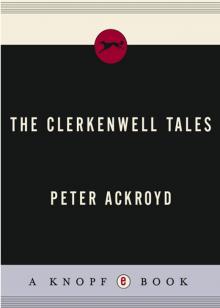 The Clerkenwell Tales
The Clerkenwell Tales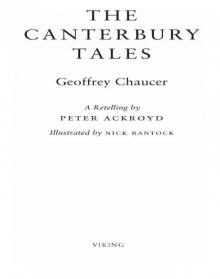 The Canterbury Tales
The Canterbury Tales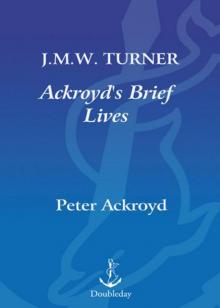 J. M. W. Turner
J. M. W. Turner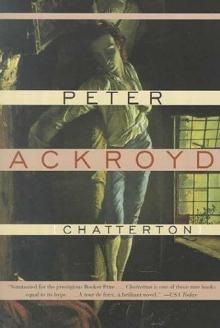 Chatterton
Chatterton The Canterbury Tales – A Retelling
The Canterbury Tales – A Retelling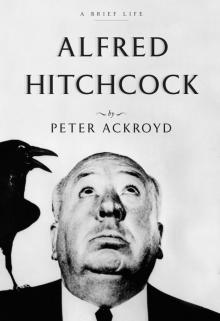 Alfred Hitchcock
Alfred Hitchcock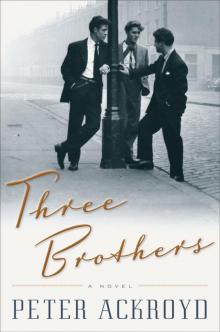 Three Brothers
Three Brothers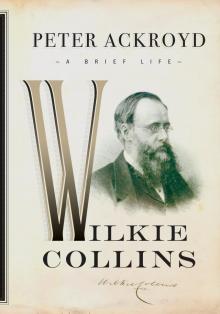 Wilkie Collins
Wilkie Collins Venice
Venice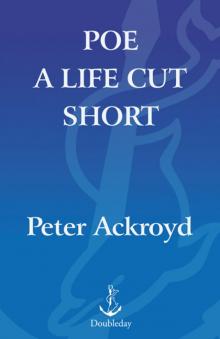 Poe
Poe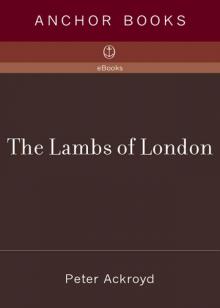 The Lambs of London
The Lambs of London London
London Queer City
Queer City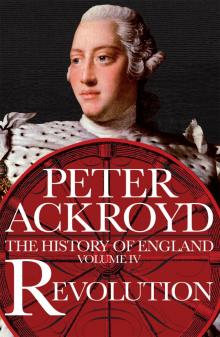 Revolution, a History of England, Volume 4
Revolution, a History of England, Volume 4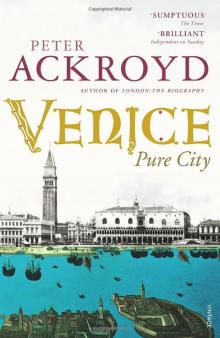 Venice: Pure City
Venice: Pure City Foundation
Foundation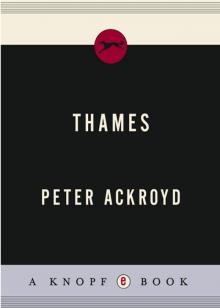 Thames
Thames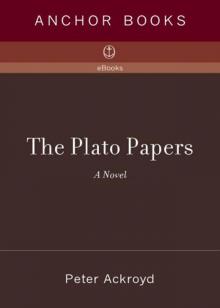 The Plato Papers
The Plato Papers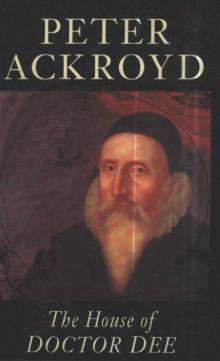 The house of Doctor Dee
The house of Doctor Dee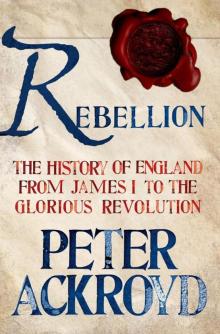 Rebellion: The History of England from James I to the Glorious Revolution
Rebellion: The History of England from James I to the Glorious Revolution Albion: The Origins of the English Imagination
Albion: The Origins of the English Imagination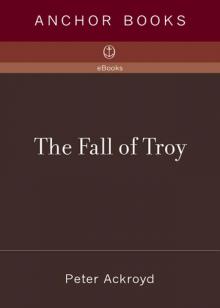 The Fall of Troy
The Fall of Troy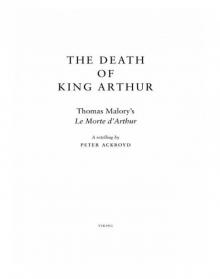 The Death of King Arthur
The Death of King Arthur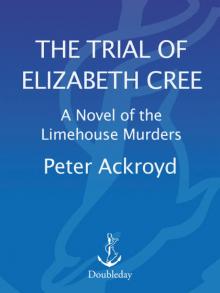 The Trial of Elizabeth Cree
The Trial of Elizabeth Cree London: The Biography
London: The Biography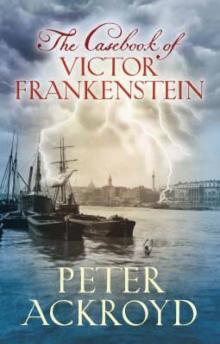 The Casebook of Victor Frankenstein
The Casebook of Victor Frankenstein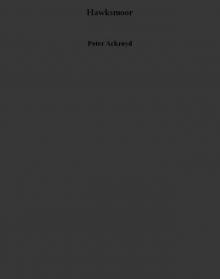 Hawksmoor
Hawksmoor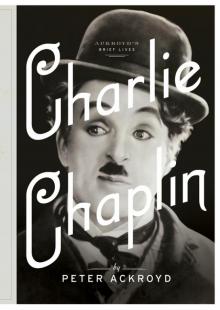 Charlie Chaplin
Charlie Chaplin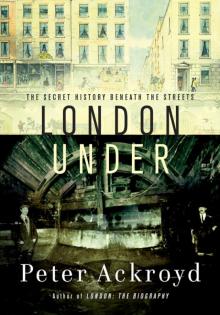 London Under
London Under